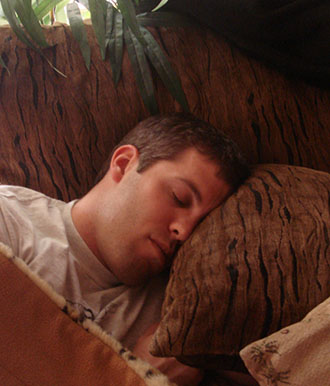The AtD “roll out” Challenges are Rolling in

For a dare, would you go without a shower for three days? Sleep on anything BUT your own bed? Seek out free medical care for your dental needs?
Staff members Caroline Hopkins, April Hamlin and Danielle Haskett did each of these things as part of a campus initiative to increase awareness of issues many college students face.
This initiative, Achieving the Dream, is a national program to help U.S. college campuses increase retention by identifying and addressing student needs and potential barriers to their success. The program at UCC began with a “roll out” celebration on Jan. 23.
At the AtD “roll out,” 22 people in total signed up for the challenges. Faculty, staff and students were all eligible for the exercises which represented real-life situations that some students have to overcome. The challenges included such things as doing homework without the internet or registering for food stamps, and some of the challenges were more difficult than others.
So far, four responses to the challenges have been received, Mandie Pritchard, director of Counseling and Advising said. She is expecting several more to come.
Caroline Hopkins, advising specialist for TOP, was one of the first staff members to complete a challenge. She went three days without a shower. Hopkins did wash her hair in the kitchen sink and give herself sponge baths but never took an actual shower or bath.
For Hopkins, the hardest part of the challenge was dealing with the way she felt. “It was difficult to feel confident when I was constantly conscious of my poor hygiene,” Hopkins said.
Unfortunately for Hopkins, her challenge hit at the same time as her son’s first birthday party. The party included over 25 of their closest friends and family members and with everyone in close proximity, Hopkins remembers feeling self-conscious. Her mother took pictures that day, but for Hopkins they don’t hold the happy memories they should. “I hate the pictures of that day because I can see how I felt even if other people can’t,” Hopkins said.
“It was clear to me how negatively the inability to shower affects one’s sense of self-worth and how students may not participate as fully if they are facing this,” Hopkins said.
“When they feel confident, they are more likely to speak up, be seen and participate. Our students may be achieving at a lower level than their potential because their circumstances are profoundly affecting their sense of self-worth,” Hopkins said.
April Hamlin, director of Adult Basic Skills, took the challenge to sleep on a couch for a week. Hamlin exceeded the challenge by spending a total of eight nights without sleeping in a bed. Three of the nights were spent at her parents’ house sleeping on the floor of their living room.
One of the most difficult things for Hamlin to deal with was the discomfort of her couch. “I spent one night making a mental list of the people that I needed to send a note of apology to for the nights that they slept on the couch without complaining about how uncomfortable it was,” Hamlin said.
Hamlin said that sleeping at her parents’ house might be closer to the actual experience of a student sleeping on a couch. “It was a bedroom mess that had to be picked up every morning and put back each evening, going to bed with the last person in the house and waking up with the first person, interruptions throughout the night when the front door was used or people walked through on their way to someplace else,” Hamlin said. “That was more of a challenge than the first five nights.”
Hamlin was mindful of the fact that the challenge was her choice and of a limited duration. “There is a big difference between having a choice about participating in a time-limited challenge such as this one and the fact that, for many, this challenge is their reality,” Hamlin said. “I can’t imagine trying to sit in class and concentrate, do homework and study and have time for other commitments when feeling sleep-deprived and lacking a quiet space to call one’s own.”
“I was reminded that I am very blessed to be able to live in the manner that I do,” Hamlin added.
Danielle Haskett, Disability Services Coordinator, described her medical challenge as “fairly easy.” She was to put herself in the role of a student who does not have health insurance and needs to have a tooth pulled or a crown repaired. Her challenge involved seeking out resources within the community that provided help with dental needs.
The day before receiving her challenge, Haskett obtained a copy of The Mainstream student newspaper with an article about the dental van that periodically comes to campus. That article told her everything she needed to know about where to go, how to qualify and who to call for an appointment.
The newspaper article was the resource she needed to complete her challenge. “The challenge wasn’t very difficult, because The Mainstream had done such a good job on the article,” Haskett said.
As responses to the challenges continue coming in, the information will be collected and eventually shared with the entire staff. Most likely that will happen in September at fall inservice, Pritchard said.
